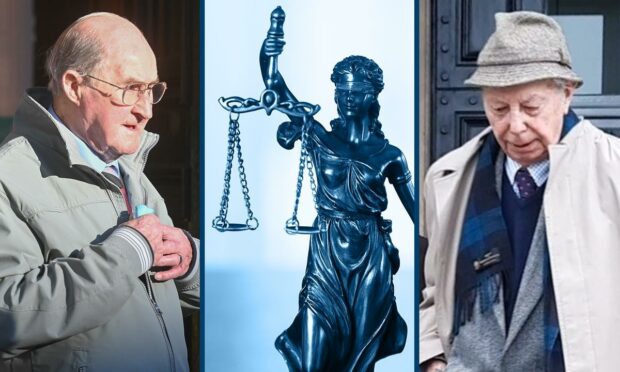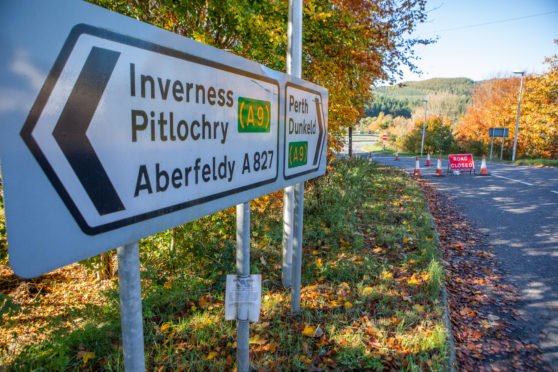A banned Perthshire pensioner has slammed his sentence after seeing a knighted motorist keep his licence despite causing a crash on the A9.
Meigle man John Milne blasted the sentence handed to Sir Donald Miller, who admitted crashing into a car with a pregnant woman inside, leaving the driver with an injured wrist.
It came just weeks after Mr Milne was banned at Aberdeen Sheriff Court for joining the wrong side of the carriageway on the A90 for just 30 collision-free metres.
88-year-old former HGV driver Mr Milne is now preparing to resit his test in 11 months.
Mr Miller’s case
Sir Donald, 95, brought the A9 in Highland Perthshire to a standstill after a horrific crash but has been allowed to keep driving.
The knight, from Kilmacolm, admitted driving carelessly and pulling out into traffic on the A9 in the middle of the afternoon.
Perth Justice of the Peace Court heard another driver and his pregnant passenger had no chance to get out of the way of Sir Donald’s BMW.
Their Toyota Hilux smashed into the side of his car and pushed it some distance down the dual carriageway in a crash which left the road blocked in both directions.
Sir Donald, the first chairman of Scottish Power, was not disqualified after the court was told he had a clean driving licence and a lengthy, blemish-free driving record.
He said: “At the time I was suffering from cataracts and had been waiting for an operation for 18 months or more but I had not been told not to drive.”
He was given six penalty points and a £400 fine.
Mr Milne’s case
Mr Milne pulled out of a junction on the A937 but instead of driving across the northbound carriageway on to the southbound one, he began to drive south in the northbound lane.
He continued for around 30 metres before turning off towards Marykirk.
A witness said she and her son observed there was an oncoming heavy goods vehicle.
Mr Milne, of Meigle, pled guilty to dangerous driving.
Defence agent Michael Tavendale said: “Mr Milne is an 88-year-old man who has been driving for some 70 years, having originally learned to drive in the Army in Korea.
“Immediately following the incident he was assessed by a driving instructor.
“He saw no particular difficulty with his driving and it’s still somewhat of a mystery to Mr Milne as to how he came to get himself into this situation.
“Obviously he could have gone straight across but once he turned right rather than straight across, he realised his error but it was too late and he just carried on.”
Mr Tavendale described it as a “sad day” for his client, who he said had one conviction for speeding from “probably about 40 years ago”.
At Aberdeen Sheriff Court, Sheriff Mark Thorley said the incident could have ended in “disaster”.
He fined Mr Milne £420 and banned him from driving for a year.
Consistency claim
Mr Milne, who insists there was no oncoming HGV in his case, has questioned the sentencing.
“I made a mistake.
“There was nothing else. There was no traffic.
“I admitted it right away. I didn’t think it was the crime of the century.
“The procurator fiscal would not accept anything other than dangerous driving.
“He would not accept driving without due care or attention.”
Mr Milne began working as a long distance lorry driver 70 years ago and only had a single blemish in his career, picking up a £10 fine in the 1970s for speeding between Penrith and Scotch Corner, days after the limit had changed.
Now, he finds himself unable to easily access the supermarket and chemist he says his family relies on.
He said of Sir Donald’s penalty: “People I’ve spoken to were absolutely shocked.
“I could have done with nine points or six points and a fine but I’m banned.
“I didn’t cause anything. I think it was a bit harsh.”
Convictions and sentencing
Any person convicted of careless driving faces having between three and nine penalty points imposed on their licence and a fine of up to £5,000.
Disqualification is discretionary for particularly concerning incidences.
Motorists judged to be careless are those who drive without reasonable consideration for other persons using the road or place or in a manner that falls below what would be expected of a competent and careful driver.
Dangerous driving convictions carry mandatory bans, heftier fines and a potential prison sentence
For driving to be considered dangerous, the incident needs to be capable of causing injury to anyone else or damage to property.
The Judicial Office for Scotland has previously pointed out presiding sheriffs must have regard to the facts presented to the court, the circumstances of the offender and impact on victims, as well as Scottish Sentencing Council guidelines.










